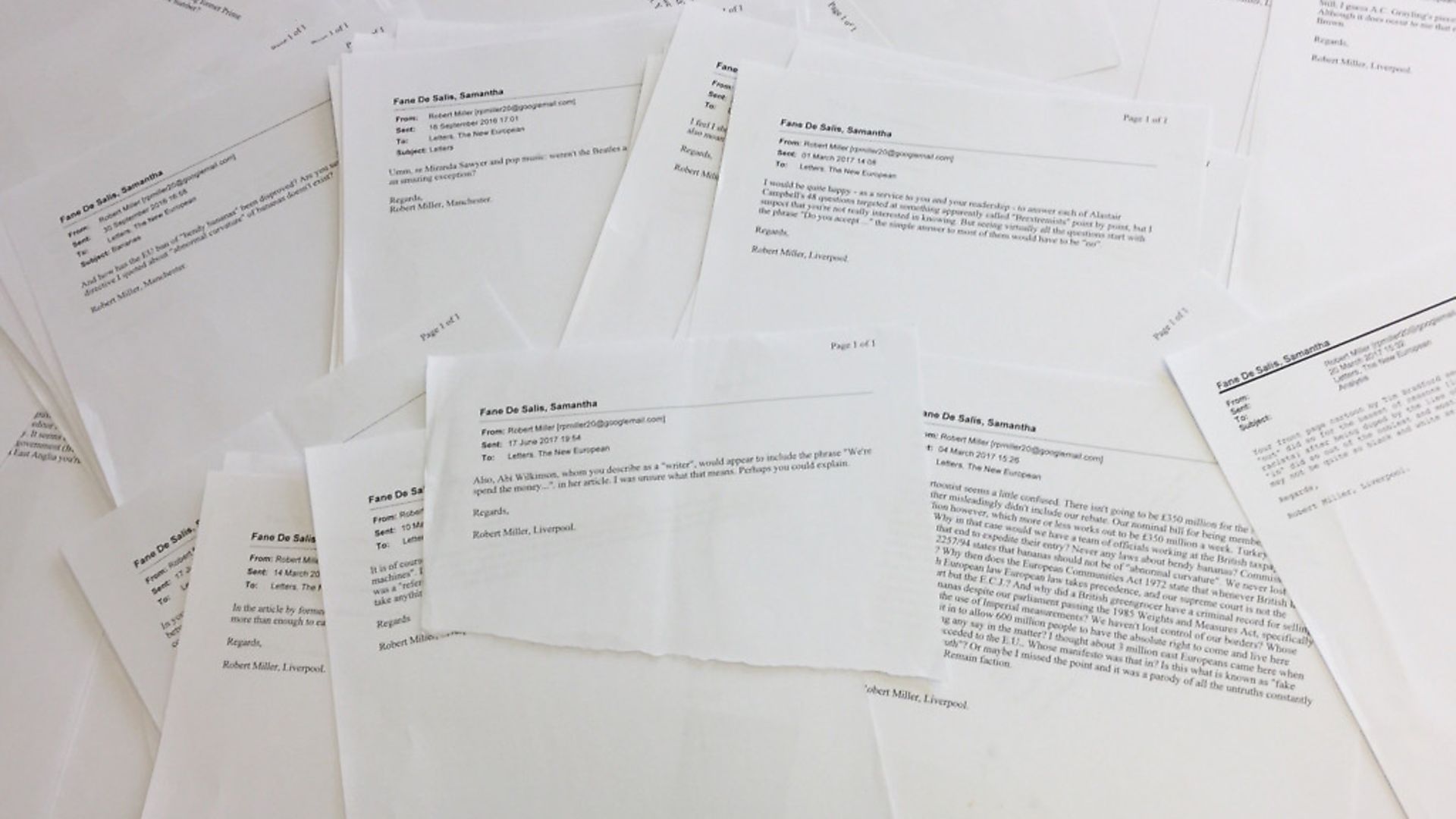
The New European has finally decided to publish one of persistent Brexiteer Robert Miller’s letters. But was it worth the wait?

Had The New European ever seen fit to publish any of my letters, or, indeed, had any of my letters to the newspaper been publishable (which as a judgement strikes me as a little harsh, although they did once inadvertently print half of one and a chunk of another as a quote), some readers may have gotten the impression that I was rather against the European Union.
However, I can here categorically state that this is not the case. What I am against is our membership of it. If other countries wish to subsume their ancient – and in some cases not so ancient – national identities beneath a supranational bureaucracy that is entirely up to them.
But as far as I can see (not being an historian) those other countries’ legal systems were invariably based on the codified Napoleonic Code. We, however, never were. Our legal system is based upon the Anglo-Saxon Common Law and judicial precedence. We’re a square peg in a round hole.
After all, in Anglo-Saxon countries – America, Canada, New Zealand, Australia – one is free to do as one wishes unless it is prohibited; in Napoleonic Code countries you are allowed to do what the authorities permit you to do. We were completely unsuited to being a member of the EU in the first place. It’s is rather as if we joined a golf club, then complained endlessly about how they weren’t playing cricket. No wonder the other members get annoyed at us.
MORE: This man has written 118 letters to The New European
Culturally, historically, constitutionally we were and are utterly incompatible with the stated aim for ‘ever closer union’.
Indeed, when we first applied, only to be stymied (good golfing term) by Charles de Gaulle, as far as I can work out (I wasn’t around at the time) it was because economically we could see ourselves continually falling behind those initial six members of the Common Market.
Of course, just because one is a member of a club doesn’t mean that you suddenly are as wealthy as the other members of the club as they somewhat deludedly seemed to think. It took, frankly, Margaret Thatcher’s radical economic reforms in the 1980s to do that. (Some may cavil at this point.)
(Such free market measures that under the Chancellorship of Ludwig Erhard West Germany pursued vigorously in the 1960s leading to what has become known as wirtschaftwunder – or economic miracle – from the ruins of post-war Germany.)
Indeed, one of The New European cartoonists once wrote a strip pointing out all of Britain’s woes during the 70s – strikes, inflation, economic stagnation – and pointedly made the assertion that these were all cured by our membership of the EEC. Which, of course, they weren’t. Those woes continued right through the 70s and in many ways got worse after January 1, 1973, our date of accession.
But to suggest the problems besetting the country were worsened by joining the European Community – the three-day week, the Winter of Discontent, taking our begging bowl to the IMF – which all followed our joining of the European Community – would be as much a nonsense than to suggest our problems were solved simply by joining.
And historically, the only reason I can see for the EU existing at all is because France is afraid of Germany’s history and, in turn, Germany is afraid of Germany’s history. Indeed, since its creation in 1871 Germany did seem to invade France with remarkable alacrity. But what does that have to do with us? We were never invaded by Germany (well, apart from the Channel Islands, but then they are not members of the EU anyway and I wasn’t aware that they had been reoccupied by Germany).
But I’ve never gathered why those who argue that the creation of the EU has created peace amongst the otherwise eternally warring nations of Europe (which isn’t actually true anyway) imagine that political unification creates peace. Are they unaware of the civil wars that wracked England, America, Spain and latterly Yugoslavia? All unified political entities. And if you think John Major, Tony Blair, and the EU brought peace to Northern Ireland I suggest it would be wise to wait until Sinn Fein/IRA call and win one of the never-ending referendums they are allowed to call every seven years under the terms of the Good Friday Agreement on joining the Republic of Ireland to make a judgement. Will we see the Garda putting down loyalist rioting in the Shankhill and bombs on the streets of Dublin? I wouldn’t be surprised – and how many more miles of so-called ‘peace walls’ have gone up since the signing of the agreement? And actually, our involvement in Europe in the relatively recent past has always ended up disastrously anyway. Up until 1914 we were one of the richest and most powerful nations in the world, if not the richest and most powerful. That would come to be all shattered from August 4, 1914.
Just because we had signed a proverbial ‘scrap of paper’, as the then German Chancellor Theobald von Bethmann Hollweg put it, the Treaty of London in 1839 guaranteeing the neutrality of Belgium, and the Belgians were too stupid to just let the German army through its territory in 1914 to attack France, was down to them, not us. I’m sure there are throughout history ways of weaselling out of treaty obligations. That war pauperised us. Indeed, we were leant such colossal sums of money by the Americans we couldn’t actually pay it back and defaulted on the loans in the 1930s, much to their chagrin.
Again, in 1939, what was it to do with us that Germany had invaded Poland? There was nothing we could practically do about it anyway. If it weren’t for the miracle of Dunkirk – god knows why the Germans didn’t attack our forces – we’d have virtually entirely lost our somewhat puny army anyway and what sort of situation would we have been in then? Besides which, after the war we just handed Poland over to the USSR’s tyranny anyway, which wasn’t much better. Not that there was anything we could do realistically do about that either.
Surely, given the might of our naval fleet, the sensible thing to have done if Hitler had any designs on Britain and its Empire (which I’m not aware he did) would have been to sit tight behind our ‘moat defensive to a house, against the envy of less happier lands’ and wait and see. (We most certainly did not go to war to defeat Nazism; they had come to power in 1933. Or fascism: Franco was in power in Spain to his death in 1975.)
And of course more recently there was our dalliance with the European Exchange Rate Mechanism, which we were taken into by the then Chancellor of the Exchequer John Major (who loomed back into life during the referendum campaign like some zombie from a George A Romero film), and then insisted when Prime Minister that we shovel billions of pounds into maintaining the parity of the pound against a basket of European currencies until we crashed out on so-called Black Wednesday. Which led to one of the longest periods of growth in our history.
But perhaps when it comes to our membership of what was to become the European Union, you decide which of the following quotes is more accurate:
In 1962, the then Labour leader Hugh Gaitskell said this about joining: ‘We must be clear about this; it does mean, if this is the idea, the end of Britain as an independent European state. I make no apology for repeating it. It means the end of a thousand years of history. You may say: ‘Let it end.’ But, my goodness, it is a decision that needs a little care and thought.’
And in 1973, in a television broadcast, Prime Minister Ted Heath said: ‘There is no question of eroding any national sovereignty; there is no blueprint for a federal Europe. There are some in this country who fear that in going into Europe we shall in some way sacrifice independence and sovereignty. These fears, I need hardly say are completely unjustified.’
Two facts to bear in mind:
In 1985, the government passed the Weights and Measures Act specifically stating that either Imperial or metric units can be used. (According to any countries accession agreement, the EU requires them to metricate).
In 2001 greengrocer Steve Thoburn (who died tragically young; stress from the court case, perhaps?) was given a criminal record for selling a pound of (not abnormally curved) bananas.
In Sunderland Magistrates’ Court Judge Bruce Morgan stated: ‘So long as this country remains a member of the European Union then the laws of this country are subject to the doctrine of the primacy of community law… The passing of the [European Communities Act] 1972 meant that European legislation became part of our legislation…. This country… has joined this European club and by so doing has agreed to be bound by the rules and regulations of the club…’
Well – fingers crossed – not any more we haven’t.
Was The New European right to protect readers from Robert Miller’s views for a year?
Let us know… letters@theneweuropean.co.uk
You too, Robert









